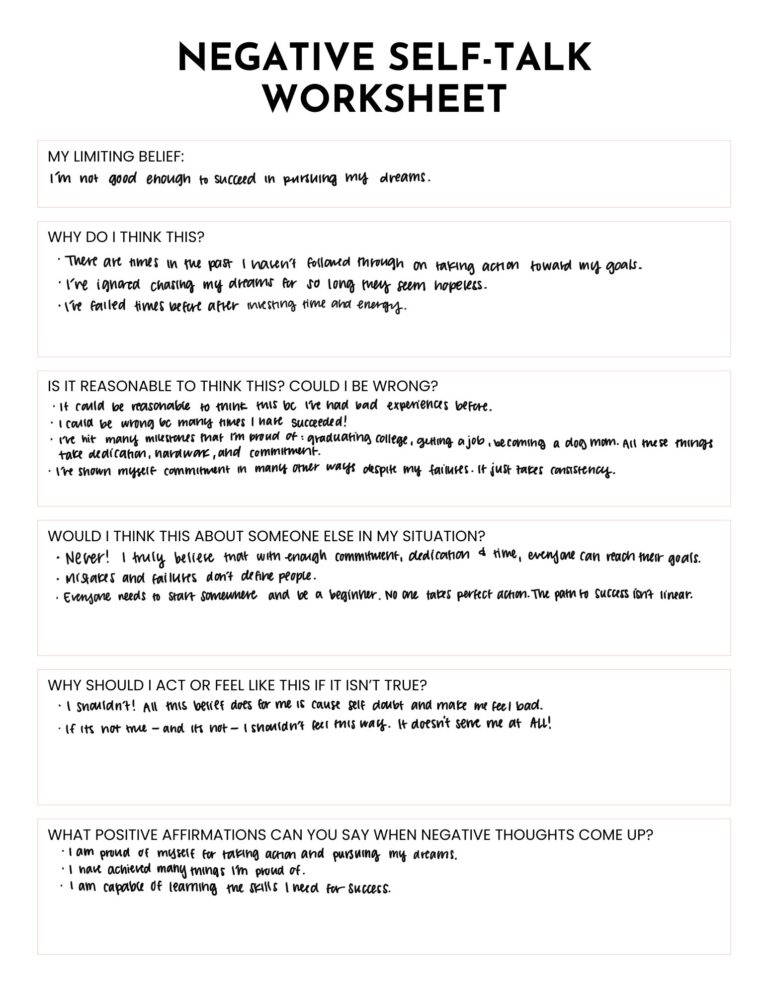FREE Printable Negative Self-Talk Worksheet
Want to conquer your negative self-talk once and for all? Download your FREE negative self-talk worksheet below!

It’s often easy to be our own worst critics, telling ourselves that we’re not good enough or criticizing ourselves whenever we make a mistake. Negative self-talk is common, but that doesn’t mean it should be. Always being our own worst enemy is a surefire way to fuel our negative emotions!
It took me a while to realize how damaging negative self-talk can be, but once I did, I wanted to fix it REAL fast. So if you’re on the journey to heal your negative self-talk and start focusing on the good things in life, this article is for you! Here, you’ll find a simple worksheet that will allow you to begin your journey towards positive thinking.
This post is a comprehensive guide on how to use this negative self-talk worksheet.
WHAT IS NEGATIVE SELF-TALK?
Negative self-talk is any critical, pessimistic, or demeaning thoughts you have. It’s any time you criticize yourself and negatively interpret situations in a way that makes you feel bad about yourself or your capabilities. There are various ways that negative self-talk can damage your mental and physical health. For example, it can cause lots of stress, which impacts the body’s critical functions. Thus, it’s extremely important to address these thought patterns. If automatic negative thoughts go chronically unchecked, it can have a huge impact on our wellness over time.
Post You Might Like: 5-Step Guide to Stop Negative Self-Talk
NEGATIVE SELF-TALK WORKSHEET OVERVIEW
This negative self-talk worksheet focuses on working through the negative self-talk patterns you currently have. It will force you to challenge these beliefs by breaking down where they come from and recognizing that they are not true. These are the EXACT reflection questions I asked myself when facing my limiting beliefs and it’s had such a significant impact on helping me overcome negative self-talk!
Here’s the breakdown of the worksheet and why each question is important:
1. Write down your limiting belief.
The first step is to identify one core negative belief you have about yourself. By focusing on one limiting belief at a time, you’ll be able really dive into why you think this and be more specific about challenging it.
EXAMPLE: I’m not good enough to succeed in pursuing my dreams.
2. Why do you think this?
Were you told this as a child? Does something remind you of this in your daily life? Were there times you couldn’t handle challenging situations that made feel bad?
EXAMPLE: There are times in the past when I haven’t followed through on taking action towards my goals. I’ve ignored chasing my dreams for so long they seem hopeless. I’ve failed times before after investing time and energy.
3. Is it reasonable to think this? Could you be wrong?
Asking yourself this will allow you to start dismantling your negative thinking. Look for examples in your past where you have proven this belief wrong! It can be something big or small.
EXAMPLE: It could be reasonable to think this bc I’ve had bad experiences before. I could be wrong bc many times I have succeeded! I’ve hit many milestones that I’m proud of: graduating college, getting a job, becoming a dog mom. All these things take dedication, hard work, and commitment. I’ve shown myself commitment in many other ways, despite my failures. It just takes consistency.
4. Would you think this about someone else in your situation?
This next step is critical because often, showing others compassion is easier than showing ourselves compassion. Seeing this through the lens of others is a great way to realize just how hard you might be on yourself!
EXAMPLE: Never! I truly believe that with enough commitment, dedication, and time, everyone can reach their goals. Mistakes and failures don’t define people. Everyone needs to start somewhere and be a beginner. No one takes perfect action and the path to success isn’t linear.
5. Should continue to act or feel like this if it isn’t true?
Why should you think this falsehood if it’s hurting your mental health and causing low self-esteem? There is NO reason to believe in something that isn’t true if it has a huge negative impact on your emotional well-being. This question just shows you how absurd believing in these negative beliefs is!
EXAMPLE: I shouldn’t! All this belief does for me is cause self-doubt and make me feel bad. If it’s not true – and it’s not – it’s absurd to feel this way. It doesn’t serve me at ALL.
6. What positive affirmations can you say to yourself when this negative thought comes up?
Affirmations are a valuable tool to help you replace negative beliefs with positive thoughts. Stopping negative self-talk is only the first step to improving your self esteem. The second step is building it back up with a positive outlook on your identity and abilities!
EXAMPLE: I am proud of myself for taking action and pursuing my dreams. I have achieved many things I’m proud of. I am capable of learning the skills I need for success.
HOW TO USE THE NEGATIVE SELF-TALK WORKSHEET
Before you use this worksheet, you’ll need to first self-monitor your thoughts. Start recognizing when and where these negative thoughts occur. What are the types of negative thoughts you have? Jot these down in a notebook or in a notes app on your phone. Once you have a clear understanding of which negative thoughts appear the most in your mind, you can jump into using this worksheet.
Next, download this worksheet. Be very honest with yourself when thinking through each question.
Lastly, incorporate positive affirmations into your daily routines. Anytime you feel especially triggered by negative thinking, revisit these worksheets. Use these worksheets as a powerful tool to remind yourself that these limiting beliefs aren’t true.
RESOURCES BEYOND THIS NEGATIVE SELF-TALK WORKSHEET
Using this challenging negative thoughts worksheet is a great way to get started on stopping negative self-talk. In addition to this worksheet, there are many other ways to build your confidence and improve your mental health. This post on negative self-talk has other strategies to help combat negative self-talk, such as practicing mindfulness exercises and focusing on positive self-talk!
Furthermore, sometimes the root causes of negative self-talk are so deep that you might need additional support. There are so many supportive therapists and counselors who are trained in cognitive behavioral therapy techniques that can provide you with personalized care. I truly believe the best form of self-care is knowing when to ask for help. So don’t be shy to sign up for therapy sessions. It is an incredibly valuable resource that can skyrocket your personal growth!
This post was a guide to using this free negative self-talk worksheet.

